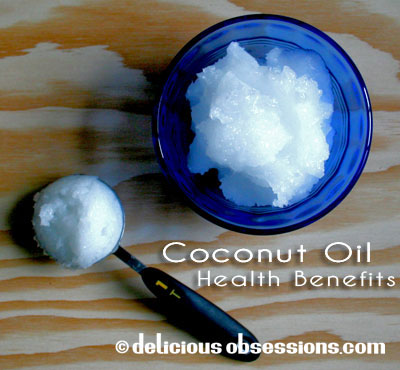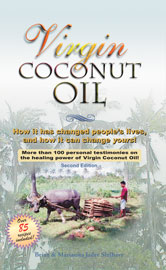FTC Disclosure: Delicious Obsessions may receive comissions from purchases made through links in this article. As an Amazon Associate I earn from qualifying purchases.Read our full terms and conditions here.
Coconut oil is a staple in my kitchen for many reasons, including health benefits. I use it for just about everything! I consider it a super food because of all of the wonderful things it can do for your body. In addition to coconut oil, coconut milk and coconut meat are also very nutritious. I use coconut milk in place of dairy since I don’t have easy access to raw milk and most pasteurized milk products don’t agree with me.
The first thing to remember about coconuts and coconut oil is that they have been a major source of nutrition in traditional cultures for hundreds, if not thousands of years. One thing that I always like to do when assessing food is to think about the traditional cultures who eat that food item. If they have been eating that item for eons, then I consider it to be real food.
MCFAs and LCFAs
Since the middle of the 20th century, saturated fat has been portrayed as a the bad guy. Coconut oil is a saturated fat, but it is important to understand that not all saturated fats are created equal. Saturated fat is an essential nutrient that is needed for the body to maintain proper cellular function. Coconut oil has the highest amount of saturated fats, at 92%, but well over half of those are made up of medium-chain fatty acids. Medium-chain fatty acids (MCFAs) are metabolized much differently than long-chain fatty acids (LCFAs), which is what most vegetable and seed oils consist of. Contrary to most mainstream medical advice, MCFAs do not raise cholesterol levels and they actually have been shown to help protect against heart disease. Studies have shown that they can help lower the risk of atherosclerosis and heart disease.
Lauric Acid
The most important MCFA in coconut oil is lauric acid. Coconut oil is made up of about 50% lauric acid. The best place to find lauric acid in abundance is in a mother’s breast milk. Lauric acid is critical for immune development and function, which is why infant formula has lauric acid added to it. Lauric acid is not only needed by babies, but it’s an essential nutrient for all of us in order to keep our immune systems functioning optimally. Sally Fallon recommends that people with compromised immune systems should consume between 20 and 25 grams of lauric acid per day, which is the equivalent of 3-4 tablespoons of coconut oil. The next best place to get lauric acid, after coconut oil, is in grass-fed milk fat or butter. All other oils are deficient in MSFAs.
Studies have also shown that MCFAs actually help boost metabolism and can prevent weight gain and even stimulate weight loss. This is because they are easily digested and quickly turn into energy and they do not spike blood sugar levels because insulin is not needed to help digest the oil. This helps alleviate the strain that other oils can put on the pancreas and digestive system. In addition to helping the immune system and providing quick, healthy energy, it has also been shown to help regulate and maintain normal thyroid function.
Health Benefits
While coconut oil is not quite back into the mainstream diet, it is gaining popularity and the scientific community is beginning to acknowledge the potential health benefits of this oil. Some reports show that coconut oil can potentially help with the following problems:
- Kill viruses, bacteria, yeasts and fungus
- Eliminate parasites
- Boost energy
- Improve digestion and absorption of nutrients
- Improve insulin levels and helping regulate blood glucose
- Eliminate stress on the pancreas
- Prevent osteoporosis
- Reduce inflammation
- Support thyroid function
- Prevent weight gain and promote weight loss
- Reduce skin ailments like eczema and psoriasis
- Control dandruff
- Help prevent wrinkles and sagging skin
This is not a complete list of the wonderful benefits of coconut oil, but it is a few of the things that studies have shown coconut oil to help with. I am not a doctor, nor am I recommending that coconut oil is a treatment for illness. I just have done a lot of research and spoken with a lot of people who have had success in the areas above when adding coconut oil to their diet. I personally use coconut oil for just about everything, from sauteing to baking to skin care. It is a very versatile oil and should become a mainstay in your kitchen.
Important disclaimer: None of these statements have been evaluated by the FDA and are based on the testimony of family, friends, and readers. Coconut oil is not a drug or a medicine, it is a food.
Tell me, what do you use coconut oil for? If you want to see more ways to use coconut oil, check out my recent posts titled “52 Uses for Coconut Oil – The Simple, The Strange, and The Downright Odd!” or “122 Uses for Coconut Oil – Even More of the Simple, the Strange, and the Downright Odd!“
You can also check out more of my writing on coconut oil:
- Let’s Get Personal: How Coconut Oil Has Been Helping Me (where I talk about my weight loss success by upping my coconut oil!)
- Coconut Oil for Pets (coconut oil is not only good for us, it’s good for our furry and not-so-furry friends too!)
- Coconut Oil and Alzheimer’s (information showing how coconut oil might be able to help those suffering from Alzheimer’s)
- Coconut Oil Hair Treatment with Honey and Egg Yolks (Perfect for deep conditioning and treating frizzy, dry hair!)
For lots of health-related information on coconut oil, I have found this book from the founders of Tropical Traditions to be very informative.
Sources:
- Nourishing Traditions by Sally Fallon
- Eat Fat, Lose Fat by Sally Fallon and Dr. Mary Enig
- Coconut Oilby Dr. Mercola
- Health Benefits of Coconut Oil by Coconut Connections
- The Coconut Oil Miracle by Bruce Fife



31 Comments